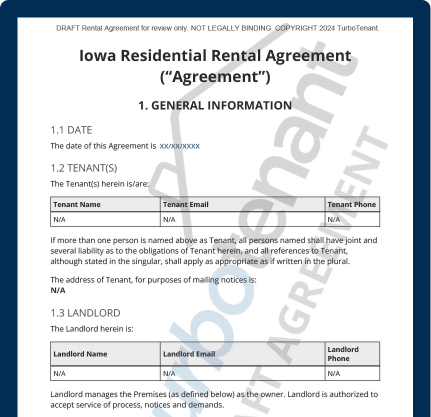Navigating Iowa’s rental market can be challenging due to its various rules and regulations. Both owners and renters should familiarize themselves with Iowa landlord-tenant law, which ensures legal protections and fairness for all parties.
This guide covers key aspects of Iowa’s rental laws in 2024, including lease agreements, fair housing, eviction processes, tenant rights, and more.
Stick around and keep reading to gain practical insight into just about everything you need to maintain your rights as a landlord or tenant in Iowa.
Marketing. Applications. Leases. Payments.
Key Findings: Landlord-Tenant Rights & Responsibilities
The Iowa state legislature has defined a set of rights and responsibilities for both landlords and tenants. We’ve detailed the most important below:
Iowa landlords have the right to:
- Collect rent: Landlords can set the terms for rent amounts in the lease agreement.
- Screen tenants: Landlords may conduct background and credit checks, provided they comply with fair housing laws.
- Charge deposits: Landlords are free to charge a security deposit up to a maximum of two months’ rent.
- Enter the property: Landlords can enter rental units for maintenance or inspections with appropriate advance notice.
- Terminate leases: Landlords may end rental agreements for valid reasons, including non-payment or lease violations.
Iowa landlords are responsible for:
- Maintaining habitability: Rental properties must meet basic safety and health standards, including functioning utilities and structural integrity.
- Providing disclosures: When applicable, tenants must be informed of any hazards, such as lead-based paint or radon.
- Respecting tenant privacy: Proper notice must be given before entering a rental unit, except in emergencies.
- Returning deposits: Landlords must refund security deposits or provide an itemized list of deductions within 30 days of a tenant’s move-out.
- Adhering to lease terms: The lease outlines all obligations, such as repairs or agreed-upon amenities.
Iowa tenants have the right to:
- A habitable unit: Every tenant is entitled to a rental unit that meets health and safety standards.
- Request repairs: When necessary, tenants can notify landlords about maintenance and expect a timely response.
- Quiet enjoyment: Landlords must inform tenants before entering their unit, except in emergency situations.
- Dispute unfair charges: Tenants can challenge improper deductions from security deposits.
- Break a lease: In specific cases, such as military deployment or uninhabitable conditions, tenants can terminate their lease without penalty.
Iowa tenants are responsible for:
- Paying tent: All rental payments must be made on time and per the lease terms.
- Maintaining the property: Tenants should avoid causing damage beyond normal wear and tear.
- Reporting issues: Maintenance concerns must be reported promptly to prevent further complications.
- Complying with lease terms: Specific rules about pets, smoking, or other conditions outlined in the lease must be followed.
- Providing due notice: Advance notice must be given for lease termination, as specified in the rental agreement.
Best Practices for Screening Prospective Tenants
Landlords must find reliable tenants. They can charge a reasonable, transparent rental application fee with no state-mandated maximum. Tenant evaluations may include credit, criminal, and rental history, but written consent for background checks is required.
By following these guidelines, landlords can assess tenants while respecting Iowa tenant rights. TurboTenant’s tenant screening features make it easy for landlords to comply with Iowa landlord-tenant law as they search to fill their rental units.
Sign up for a free account today to start finding your ideal candidate.
Compliance with Fair Housing Laws in Iowa
Federal fair housing laws ensure all renters have equal opportunities to secure housing. Iowa landlords must comply with these regulations to avoid legal complications.
What actions are considered housing discrimination?
Landlords must avoid prohibited actions such as:
- Refusing to rent based on race, color, national origin, religion, sex, familial status, or disability.
- Publishing discriminatory rental advertisements.
- Applying inconsistent screening policies across applicants.
How can discrimination be avoided in rental practices?
Effective, fair tenant screening requires developing clear, written screening criteria that are consistently applied to all applicants. Landlords would be wise to standardize and document all aspects of their decision-making process.
Further, staff training is critical in fair housing compliance. Landlords are liable for the actions of their staff, so make sure they’re up to code. Well-trained staff can prevent costly legal mistakes and create an inclusive, legally compliant rental environment.
What are the repercussions for fair housing violations?
Violations can result in:
- Financial penalties or compensation for affected tenants.
- Legal actions and potential court orders to correct discriminatory practices.
- Damage to a landlord’s reputation and future rental prospects.
Landlords facing discrimination claims should immediately seek legal counsel specializing in Iowa landlord-tenant law.
Iowa Lease Agreements
A clear and legally binding Iowa lease agreement is crucial for preventing misunderstandings between landlords and tenants.
While oral agreements are valid for some tenancies, written leases — month-to-month or fixed-term — are highly recommended to establish clear terms and protect both parties.
Which lease terms are legally required in Iowa?
There are no required terms in Iowa for general lease agreements. However, there are specific terms that all leases should include to bolster the enforceability of a contract, including:
- Names of all involved parties
- The lease duration
- Rent amount and due date
What constitutes legal renting in Iowa?
In Iowa, all legal rentals must:
- Comply with building codes and safety regulations
- Be free of hazards that could endanger tenant health or safety
- Adhere to local occupancy limits
What tenant documentation is required?
Tenants must provide valid ID, proof of income, and a completed rental application, along with references if requested. Keeping records of leases, rent payments, and landlord correspondence can help protect Iowa tenant rights in 2024.
What are the mandatory landlord disclosures in Iowa?
In addition to the federal lead-based paint disclosure for properties built before 1978, Iowa landlords must make the following disclosures:
- Identifying information: Landlords must disclose the name and address of the property owner or their authorized agent [Iowa Code § 562A.13(1)].
- Utilities: Landlords must detail utility rates, charges, and services if the tenant is not directly responsible for paying the utility company [Iowa Code § 562A.13(4)].
- Environmental status: Landlords must disclose in writing if the property is listed in the U.S. EPA’s environmental response database [Iowa Code ¬ß 562A.13(6)].
Security Deposits in Iowa
Security deposits safeguard landlords against potential damages or unpaid rent, allowing them to maintain habitable and appealing rental properties for future tenants.
What are the guidelines for security deposit collection?
Iowa landlords can collect a 2-month security deposit without notifying the tenant of its location. Providing a move-in checklist can help minimize disputes.
When can deductions be made from security deposits?
Landlords can only make deductions from security deposits for:
- Unpaid rent or utility bills.
- Damage to the property exceeding normal wear and tear.
- Costs for cleaning if the property is left unreasonably dirty.
For any deductions, landlords must provide an itemized statement detailing the specific charges and their amounts.
How should security deposits be returned?
Landlords in Iowa must return security deposits within 30 days of tenant move-out. They must conduct a thorough property inspection to assess damages or unpaid obligations. Tenants must receive a detailed, written statement with supporting documentation detailing any deductions.
Maintenance Responsibilities of Landlords
Iowa law mandates landlords maintain rental units that are safe, habitable, and compliant with health standards. Failure to meet such standards can result in legal action or tenant remedies such as withholding rent.
What are the legal standards for property conditions?
Iowa landlords must maintain rental properties in a livable and safe condition. They must ensure that essential systems like plumbing, heating, and electrical are functional and address health or safety hazards. Landlords are also responsible for timely repairs and maintaining essential services.
What is the proper protocol for repairs?
Tenants have the right to request repairs. Landlords must respond promptly, generally within a reasonable timeframe, depending on the issue’s urgency.
If a landlord neglects repairs, tenants may be allowed to withhold rent or perform the repair themselves and deduct the cost from their rent.
Do landlords need to give tenants advance notice before accessing a rental property?
Landlords must give tenants 24 hours’ notice before entering the rental unit, except in emergencies. Failing to provide proper notice can be considered an invasion of privacy and may result in legal penalties or tenant claims.
Late Rent Fee Regulations
Iowa law does not mandate a grace period for late rent payments. That said, landlords are free to include a grace period (typically between 3 and 5 days) in their lease agreements as a courtesy to tenants.
Iowa ties late fees to the rent amount: for rents under $700, the fee is $12 per day, capped at $60 per month; for rents over $700, the fee is $20 per day, capped at $100 per month.
Rent Control in Iowa
Iowa has no rent control laws. Landlords can set rental prices freely. However, they must provide notice before raising rent and can only increase rent at the end of a lease.
Lease Renewal and Termination
For lease renewal and termination, month-to-month leases require a 30-day notice.
Fixed-term leases end on the stated date unless renewed. Landlords aren’t required to renew but cannot refuse for discriminatory or retaliatory reasons.
Tenants can break leases with proper notice for military service, harassment, or uninhabitable conditions. Landlords can terminate early for lease violations or specific clauses.
Eviction Procedures for Iowa Landlords
Since eviction laws vary by state, Iowa landlords must adhere to their state’s specific rules to ensure compliance. Legal reasons for eviction include:
- Non-payment of rent
- Lease violations, such as unauthorized pets
- Illegal activity on the premises
What justifications exist for eviction?
Iowa allows fault-based (just cause) and no-fault evictions, provided the correct notice is given. Proper documentation of tenant violations is critical for legal proceedings.
What is the eviction process?
Under Iowa landlord-tenant law, eviction proceeds as follows:
- Serve notice: Provide a 3-day notice for nonpayment of rent or a longer notice for other violations.
- File an eviction lawsuit: If the tenant does not comply, file a petition in court.
- Attend a Court Hearing: Both sides present evidence supporting the eviction.
- Obtain a writ: If the court rules in the landlord’s favor, landlords may proceed with a writ of possession to reclaim the property.
How is property reclaimed after eviction?
After winning an eviction, landlords must obtain a writ of execution to have law enforcement remove the tenant. Landlords should not remove tenants themselves.
Once the tenant is out, change the locks and assess the property. Iowa law requires written notice for abandoned belongings, giving the tenant 7 days to reclaim items before disposal or sale.
Local Ordinances for Landlords and Tenants
For state-specific landlord-tenant laws, refer to the Iowa Code, Chapter 562A, which governs the Uniform Residential Landlord and Tenant Law.
Local ordinances may vary significantly. For example, some cities may have additional housing standards or regulations regarding eviction procedures.
For more information, Municode is a reliable resource for checking city and county ordinances specific to your location.
Federal Landlord-Tenant Laws
In addition to local and state laws, federal laws such as the Fair Housing Act and Americans with Disabilities Act regulate landlords’ actions. Landlords should be aware of these laws to avoid potential legal issues.
Below are a few resources on federal laws that landlords can avail themselves of:
Managing Tenant Legal Disputes as an Iowa Landlord
Disputes between landlords and tenants can arise, and legal assistance may be required to resolve them. Just as tenants can avail themselves of the Iowa tenant rights hotline, so too do landlords have recourse available to them in the event of a dispute, including:
- Iowa Legal Aid: Free legal assistance for low-income residents
- Iowa State Bar Association: Connects landlords with qualified attorneys
- Drake Legal Clinic (Des Moines): Offers legal services for housing disputes
Navigate Your Landlord-Tenant Relationship with TurboTenant
Managing rental properties can often be a time-consuming, complex ordeal. TurboTenant offers free property management software that provides a comprehensive solution to help landlords run their rental properties while complying with Iowa landlord-tenant law.
Key features include:
- Online Rental Listings: Easily create and manage professional rental listings to attract quality
- Tenant Screening: Conduct legally compliant screening to prevent lawsuits.
- Rent Collection: Streamline rent collection with online payments and automated reminders.
- Lease Management: Create, manage, and store digital lease agreements, reducing paperwork and ensuring compliance with Iowa tenant rights.
Simplify property management today with TurboTenant.
Sign up for a free TurboTenant account today and automate the hard work of managing property.
Iowa Landlord-Tenant Law FAQs
What are landlords required to provide by law?
Iowa landlords must provide a habitable living space that meets building and safety codes. Additional amenities, like parking or internet, are optional but may be expected in some areas.
What is the proper notice period for lease termination?
Iowa tenant rights require 30 days’ notice for month-to-month tenancies, automatic expiration for fixed-term leases, and 3-7 days’ notice for cause-based evictions.
How should utilities be handled in rental agreements?
Rental agreements should specify whether tenants pay utilities directly or reimburse landlords. Shared utilities require a clear cost-sharing method.
What maintenance rights do tenants have?
Tenants are entitled to habitable conditions and timely repairs. If landlords fail to act, tenants can request repairs in writing, conduct deduct-and-repair, or seek legal remediation.
What are the eviction rules for tenants without a lease?
Under an Iowa tenant rights no lease situation, landlords must provide notice based on tenancy type (e.g., 30 days for month-to-month). The eviction process follows the same steps as with a lease, including court action if necessary.
How are guests and tenants legally differentiated?
In Iowa, a tenant agrees to occupy a unit and pays rent for that right. A guest is a temporary visitor with no residency rights and can be asked to leave without legal notice.





